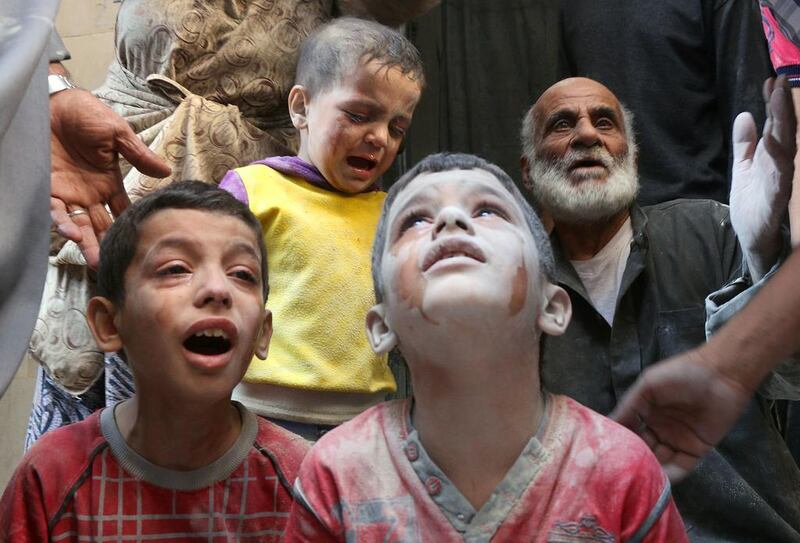BEIRUT // For the past five and a half years, US president Barack Obama’s administration has handled the civil war in Syria cautiously, unwilling to embroil America in a complicated, faraway conflict. Russia, on the other hand, has been entrenched for more than a year. Moscow’s support for the regime of president Bashar Al Assad, with personnel, aircraft and missiles, has turned the tide of the war.
Diplomatic efforts to bring even a temporary peace to Syria are at an impasse, culminating in a petulant show of tit-for-tat on Saturday when Russia vetoed a Franco-Spanish resolution in the UN Security Council and everyone else voted down an alternative Russian proposal. Despite all the dire warnings about the grim fate facing the quarter of a million civilians trapped under siege in eastern Aleppo, the only discernible outcome has been mounting pressure on the US to take firmer action and gain negotiating leverage with Russia.
Members of Mr Obama’s administration have revived a long-dead push for punitive air strikes targeting the Syrian government. Moscow takes the threats seriously enough to warn it will shoot down any aircraft engaging with Syrian forces. Eager to avoid the legacies of his predecessor’s wars in Iraq and Afghanistan, it seems unlikely Mr Obama will commit to additional force in Syria over the remaining months of his presidency. But now there are other loud voices advocating a more aggressive stance – from America’s Nato allies and from within the Obama administration itself.
On Tuesday, Russian president Vladimir Putin cancelled a forthcoming visit to Paris. He was due to inaugurate a spiritual centre at the new Russian Orthodox church near the Eiffel Tower, but after France called for the International Court to investigate Russia and Syria for war crimes, president Francois Hollande wanted to talk about Syria too so Mr Putin cried off.
On the same day, British foreign secretary Boris Johnson urged people to gather outside the Russian embassy in London to protest against Russia’s actions in Syria. Mr Johnson said Russia was in danger of becoming a “pariah nation” but downplayed the possibility of the UK imposing no-fly zones in Syria.
“We cannot do that unless we are prepared to shoot down planes or helicopters that violate that zone, and we need to think very carefully about the consequences,” he said.
Across the Atlantic, the talk is increasingly of no-fly zones, safe havens for civilians and punitive strikes against the regime of president Bashar Al Assad. To all appearances the world – or least, Nato – is ganging up on Russia.
Mr Obama may recoil from further intervention in Syria (the US already has special forces deployed there as part of the fight against ISIL, which also includes an air campaign) but come the inauguration in January, his successor may not be so reticent. During her time as his secretary of state, Hillary Clinton advocated a no-fly zone over Syria and establishing safe havens within the country. That remains her view now that she is the Democratic Party candidate for the presidency and she reiterated it in Sunday’s presidential debate in St Louis, Missouri. Echoing the current US secretary of state John Kerry, who no longer bothers to hide his frustration over Syria, Mrs Clinton said that using force would allow the US to pressure Russia into real negotiations on Syria.
“We need some leverage with the Russians because they are not going to come to the negotiating table for a diplomatic resolution unless there is a leverage over them,” she said.
Republican vice presidential candidate Mike Pence last week said he was in favour of no-fly zones, safe areas and US action against the Syrian government to protect civilians lives and confront Russia. However, his running mate – and potential boss – does not. In the St Louis debate, Donald Trump said he disagreed with Mr Pence, although they had not yet discussed policy on Syria. Mr Trump said he did agree with establishing safe havens in Syria, but wanted “other people” – such as the Gulf states – to pay for them.
If America decides on further intervention, implementing force will not be easy. Russia shows no signs of backing away from Damascus and will oppose any kind of no-fly or safe zone. For Washington, conflict with the war-weary, relatively small Syrian army is manageable. However, the possibility of direct military confrontation with Russia is another matter and extremely dangerous.
By blocking diplomatic efforts and continuing its heavy-handed military action unabated, Moscow is pushing for victory in a showdown. Syria is the cornerstone of Russia’s resurgence in the Middle East and the first country in the region where the Kremlin sees an opportunity to defeat the US in a battle for influence and power.
After Iraq and Afghanistan, the appetite for an overseas war among the US public remains low. After the Syrian government used chemical weapons on rebel-held areas in 2013 – a red line set by Mr Obama – proposed US strikes against the regime faced substantial opposition in Washington, despite their extremely limited scope. The idea was eventually scrapped.
Few Americans knew or cared about the war in Syria in 2013. Subsumed by domestic terror attacks, the fight against ISIL and the election, it has receded even further into the background.
jwood@thenational.ae
*With additional reporting from Associated Press





